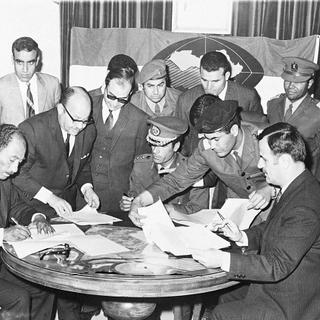


The slow rise of Hafez al-Assad, from pan-Arabism to Syrian nationalism
Series'The al-Assad saga' (Part 1/4). Before joining the military and building an Alawite caste around himself, Hafez al-Assad was a fervent supporter of the pan-Arab ideological movement.
Whose fault is it? What is to blame for the birth of one of the most ruthless dictatorships in modern history? What was the driving force behind the al-Assads, father and son, who ruled Syria from 1970 to December 2024, before their precipitous fall? Was it Alawite revenge, military paranoia or Ba'athist inflexibility? Ba'athism lies at the root of this entire period. Even before getting into the military and building an Alawite caste around himself, Hafez al-Assad was a convinced Ba'athist.
On paper, nothing destined this ideology to the totalitarian posterity it experienced in Syria and Iraq, where it came to power in the 1960s and reigned in the 1970s and 1980s before dissolving into a cult of personality and predation in the 1990s and 2000s.
As journalist and Middle East specialist Xavier Baron recounts in Histoire de la Syrie. De 1918 à Nos Jours ("History of Syria. From 1918 to the Present Day," 2014), "At the origin of the Ba'ath were three Syrians: a spiritual father, Zaki al-Arsuzi, and two founders, Michel Aflak, a Greek Orthodox Christian born in Damascus in 1910, and Salah al-Din al-Bitar, a Sunni born in 1912, also in Damascus. Zaki al-Arsuzi is an Alawite who was born in Latakia in 1901 but spent his childhood in Alexandretta." All three men studied at the Sorbonne in Paris, where Aflak and al-Bitar became friends in the early 1930s. Like Vietnam's Ho Chi Minh and Cambodia's Pol Pot, their stay in the French capital proved decisive in their intellectual training.
You have 86.6% of this article left to read. The rest is for subscribers only.
